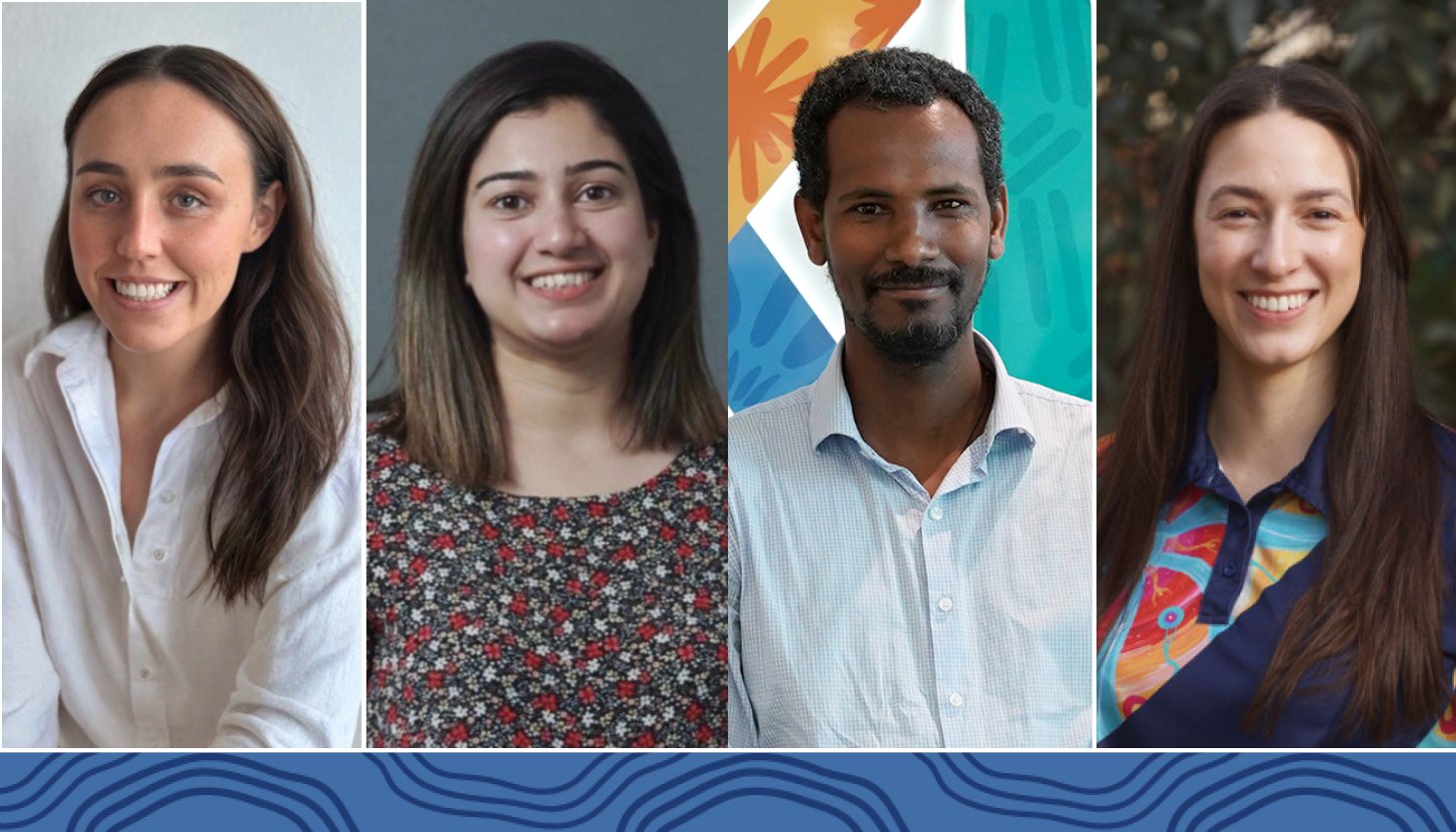
Pictured left to right: Dr Anna Boggiss, Dr Noor Ul Huda Ghori, Mr Alemneh Liyew and Dr Tamara Veselinovic.
Congratulations to four outstanding early-career researchers from The Kids Research Institute Australia, who have been awarded BrightSpark Foundation fellowships and project funding for 2026.
This is the third round of BrightSpark’s WA Early-career Child Health Researcher (ECCHR) Fellowships Program. This year there were eight fellowships on offer thanks to BrightSpark’s partnership with the WA Future Health Research and Innovation (FHRI) Fund and the Stan Perron Charitable Foundation.
We’re delighted to share that our researchers have secured four of the six fellowships awarded, with projects spanning critical areas like childhood diabetes care, influenza rates, burn-recovery, and ear infections in Western Australian children.
Co-designing better mental healthcare for WA youth with diabetes
Dr Anna Boggiss, a Postdoctoral Researcher with the Rio Tinto Children’s Diabetes Centre at The Kids and the Centre for Child Health Research, University of Western Australia (UWA), is leading a project to address the intersection of type 1 diabetes and eating disorders among young people in WA.
“The constant focus on food and insulin required to care for diabetes creates vulnerabilities that can become life-threatening, leading to complications, hospitalisations, and elevated suicide rates,” Dr Boggiss said.
Community mental health services often exclude youth living with diabetes as ‘out of scope’, while diabetes teams lack the confidence to address eating concerns.
Dr Boggiss’ project will utilise WA’s unique specialist infrastructure as one of five global Breakthrough type 1 diabetes Centre’s of Excellence and integrated state-wide paediatric diabetes service, to co-design comprehensive care pathways.
This project will identify early warning signs, understand family needs, and equip healthcare teams to better support at-risk youth.
Transforming childhood burn-recovery by studying the wound microbiome
Dr Noor Ul Huda Ghori, a Postdoctoral Researcher with the Healthy Skin and ARF Prevention team at The Kids and the Centre for Child Health Research, UWA, is leading a groundbreaking study into the wound microbiome and its role in childhood burn recovery.
This study is the first of its kind in Australia which aims to understand how microbial communities in wounds influence healing outcomes, with burn injuries remaining a significant and rising health burden in WA.
This project aims to identify early biological markers that predict poor healing outcomes and to discover microbiome-based therapeutics, like targeted probiotics, to accelerate healing.
“We will compare the wound microbiome in children with good healing versus delayed healing, and test beneficial microbes in lab grown skin models to understand how they support better wound healing,” Dr Ghori said.
“These findings will support more personalised and proactive burn care by enabling early intervention and restoring the skin microbiome, reducing scarring and improving long-term outcomes for children across WA.”
Reducing the burden of Influenza on WA kids
Mr Alemneh Liyew, a PhD Candidate in the Geospatial and Tuberculosis team based at The Kids and the Centre for Child Health Research, UWA, aims to develop a scalable, community-driven model of preventative care to reduce the influenza burden in Western Australian children.
Influenza is a leading cause of illness among children in WA, which means high rates of hospitalisation, missed school days, and significant stress for families – particularly those from culturally and linguistically diverse communities.
WA has seen unusually high flu cases and hospitalisations in 2025, while vaccination rates lag behind other states. Despite free vaccines being available, uptake remains low due to barriers in access, awareness, and culturally appropriate care.
“The preventive care model will be designed for long-term sustainability and potential scale-up across WA and nationally,” Mr Liyew said.
“By embedding cultural safety and community engagement, the model aims to reduce hospitalisations, improve health equity, and support long-term, scalable solutions.”
Innovative interventions for ear health equity in Aboriginal children
Dr Tamara Veselinovic, a Clinical Research Fellow with the Ear and Hearing Health team at The Kids and the Centre for Child Health Research, UWA, aims to improve auditory environments in early childhood to ensure no child's development is compromised by untreated ear disease.
This research initiative tackles the persistent burden of otitis media (OM) - middle ear infections - among Aboriginal and Torres Strait Islander children, which contributes to hearing loss, developmental delays, and educational disadvantage.
The project focuses on improving early learning auditory environments in early childhood settings through acoustic assessments, environmental modifications, and community feedback, and by tracking language skills over time.
“Despite extensive research, OM remains prevalent, especially in urban Aboriginal infants, half of whom experience hearing loss by their first birthday,” Dr Veselinovic said.
“Despite decades of research, OM prevalence remains high, highlighting the urgent need for culturally responsive, community-led and innovative solutions.”
By partnering with Aboriginal communities and leveraging culturally safe practices, the program aims to develop scalable, non-medical interventions that promote developmental equity and inform policy change.
